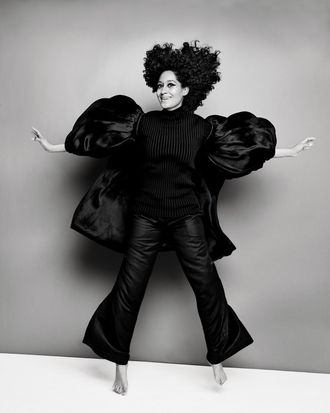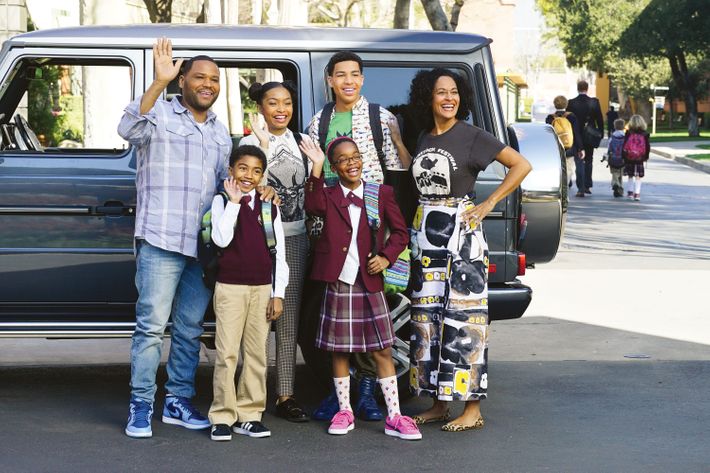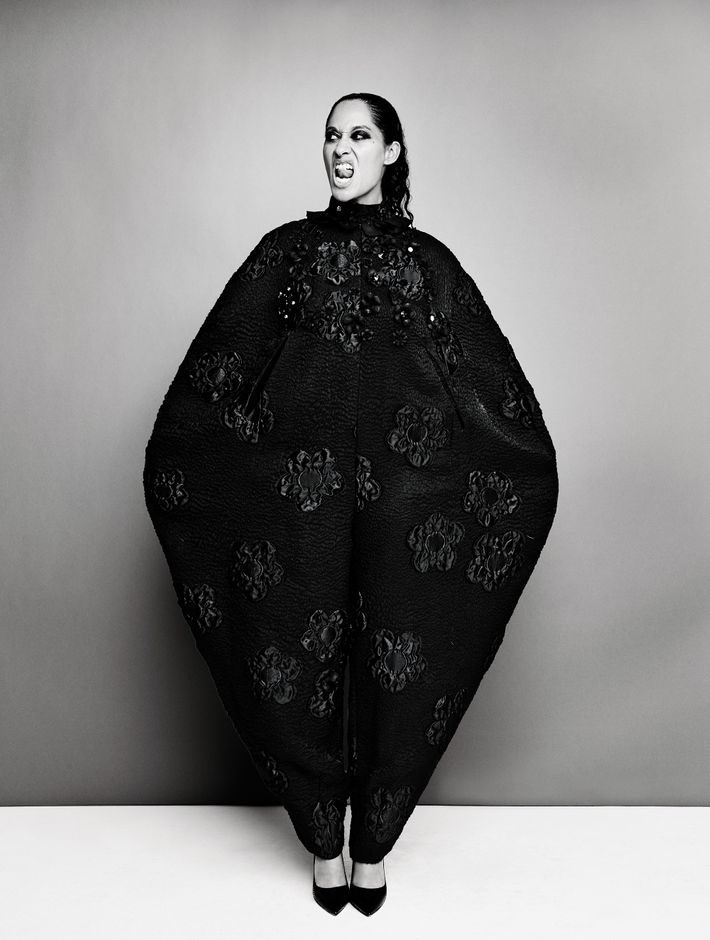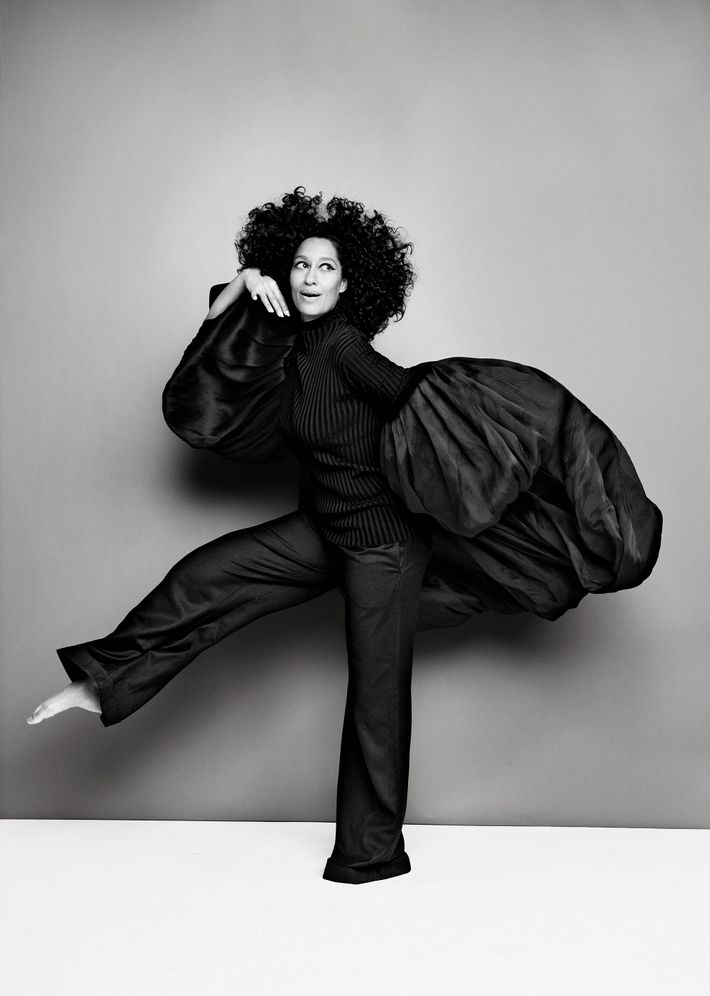
Tracee Ellis Ross is early, as she usually is ÔÇö ÔÇ£Being prompt is very serious,ÔÇØ she says ÔÇö when I meet her on West 57th Street. SheÔÇÖs wearing her favorite vintage jeans, a greenish Yohji Yamamoto duster sheÔÇÖs had for a while, and brand-new Prada platform brogues. SheÔÇÖs chatting animatedly on her phone with her father, Bob Ellis Silberstein, the gallant young music manager her mother, Diana Ross, married in 1971 after her epic relationship with Motown founder Berry Gordy became suffocatingly complicated. But that tumult ended long ago, and today her dad is a semi-retired 71-year-old who is, right now, telling his daughter about his morning bike ride in Central Park, followed by a walk with his dogs, Tupac and Snoop Dogg.
I donÔÇÖt mind waiting. Even watching the star of ABCÔÇÖs Black-ish talking on the phone on the sidewalk is fun: Ross is antic and expressive, unable to not perform. I keep thinking of her turn on Sesame Street when she did a bit about the letter B ÔÇö introducing bear, banana, basketball, and Big Bird with Muppety, pop-eyed delight. Dad update over, we walk down the block to the Wayfarer, a bilevel restaurant that seeks to evoke a kind of vaguely Vegas Rat Pack swank. And Ross notices the picture first, at the top of the stairs: ÔÇ£See?ÔÇØ she says, when she spots her mother-as-icon among photos of JFK, the hippie crowd at Woodstock, and a Playboy Bunny. She thinks itÔÇÖs probably from Mahogany.
Then the waitress arrives, and Ross squeals. ÔÇ£Your hair looks so dang cute!ÔÇØ
ÔÇ£Thank you!ÔÇØ says the server, who has twisted it up in a casual, boyish blonde side-knot. Ross orders mint green tea, which comes in a mug with a walrus drawn on it, which she also finds cute, and adds self-consciously: ÔÇ£I actually made that sound!ÔÇØ (That squeal.)
Ross was born in 1972, three years before Mahogany was released, at the height of her motherÔÇÖs pop prowess. She grew up singing in school talent shows and trying on her motherÔÇÖs fabulous clothing. On her bedroom wall, she taped up clippings from fashion magazines and practiced walking while holding her butt cheeks. (The idea was that if she could walk and still have flesh in her hand, she was too fat.) But sheÔÇÖs in many ways more like her father ÔÇö the charming ham ÔÇö than her rigorously elegant mother, closer in persona to Lucy Ricardo than to MahoganyÔÇÖs fashion-designer-on-the-make Tracy Chambers. (Although Tracee did work as a fashion editor for a while when first out of school.)
Ross is a comic actor, body-image activist, and social-media paragon of positivity. For eight years, she cultivated not-quite-mainstream fame as the neurotic but grounded lawyer Joan on Girlfriends, a sort of women-of-color version of Sex and the City that, for all its wacky geniality, managed to tartly explore things like relationships where the woman is more successful than the man and even the Iraq War. Produced, for some reason, by Kelsey Grammer, it ran on UPN and then on the CW through 2008. On Black-ish, her character, Rainbow ÔÇ£BowÔÇØ Johnson, is like Ross, mixed-race. Unlike Ross, sheÔÇÖs an anesthesiologist and a mother of four, soon to be five. The show is Michelle ObamaÔÇÖs favorite, and itÔÇÖs been a critical success. Ross tells me she recently bought the Prada brogues as a present to herself when the show was picked up for a third season.

Ross describes Black-ish with a formulation often used in interviews by its creator, Kenya Barris (who also happens to be married to a real-life doctor named Rainbow), as ÔÇ£a show about a family which doesnÔÇÖt happen to be black.ÔÇØ ItÔÇÖs a tacit diagnosis of, for example, The Cosby Show (which was clearly an influence on him, along with All in the Family). His show is about a ÔÇ£black family,ÔÇØ and Bow is not Clair Huxtable.
What that means in terms of storytelling is that itÔÇÖs about the neurotic, occasionally heart-rending, and often acrobatic identity politics of affluent African-Americans. As the voice-over (by Anthony Anderson, who plays Dre, RainbowÔÇÖs husband ÔÇö heÔÇÖs an ad executive in charge of reaching the ÔÇ£urbanÔÇØ demo) says in the first episode, ventriloquizing for Barris: ÔÇ£When brothers start getting a little money, stuff starts getting a little weird.ÔÇØ Especially as their kids grow up surrounded by smugly comfortable white people.
Ross is impatient with what she sees as the stalled conversation about ÔÇ£diversityÔÇØ in TV ÔÇö as she recently told SlateÔÇÖs DoubleX podcast, ÔÇ£I still am confused why we have to consider things black shows or not black showsÔÇØ ÔÇö and Black-ish takes on that idea directly. So does RossÔÇÖs life story: She was raised in Beverly Hills, Connecticut, New York, Switzerland, and Paris, was educated at Dalton and a Swiss boarding school and Brown, and topped all that off with a Wilhelmina modeling contract during high school. You can see her stomp her way through a couple of Thierry Mugler shows on YouTube; sheÔÇÖs beautiful, but she has way too much personality for modeling. (ÔÇ£It didnÔÇÖt work for me,ÔÇØ she once said. Photographers were always saying: ÔÇ£Can you stop talking and try to look sexy?ÔÇØ) She is more like the kids who bedevil Dre: She has thought plenty about blackishness and privilege and traditions that rub up against life choices. ÔÇ£I grew up in such a mixed world,ÔÇØ she says. ÔÇ£I was having dinner with all my girlfriends the other night, and my friend Monica was like: WeÔÇÖre like the fucking United Colors of Benetton: Korean, Chinese and Italian, Trinidadian, Polish, Ethiopian. And thatÔÇÖs just at one table. ThatÔÇÖs what my world looks like all the time, without effort. We can be all these things and be ourselves.ÔÇØ

A lot of Black-ishÔÇÖs comic energy derives from DreÔÇÖs discomfort with that kind of belief. ÔÇ£The show is generally told through DreÔÇÖs eyes,ÔÇØ Ross says, sipping from her walrus cup. Unlike Joan, her often unlucky-in-love character on Girlfriends, she thinks Bow ÔÇ£has a lot more faith. SheÔÇÖs a lot more comfortable in her skin. She has a trust in the experience in life, thereÔÇÖs an ability to lean back and let Dre be nuts and not have that be a comment on why she does or does not love him.ÔÇØ
Bow does get made fun of, quite a lot, for being biracial. It can feel at times hectoring, even abrasive. And apart from a few asides (on the pilot, she says: ÔÇ£You think IÔÇÖm not black? Why donÔÇÖt you tell my hair and my assÔÇØ), her character doesnÔÇÖt make much of it. ÔÇ£Yes, IÔÇÖm not really sure what thatÔÇÖs about, to be honest,ÔÇØ she says resignedly. ÔÇ£Sometimes, IÔÇÖm like: Wait, what?ÔÇØ ItÔÇÖs hard to say whether sheÔÇÖs talking only about her character.
I ask whether itÔÇÖs true that Barris wrote the Rainbow character for her. ÔÇ£He says he did,ÔÇØ she deadpans. (People in Hollywood are apt to make such revisionist declarations: After all, she still had to audition.) ÔÇ£I believe he had me in mind. He knew that I could ÔÇö we have always been in line for what he wanted for this role.ÔÇØ
SheÔÇÖs hardly press-shy. But she keeps her personal life private. (Her mother taught her the value of ÔÇ£mystery.ÔÇØ) She isnÔÇÖt married and doesnÔÇÖt have kids, which might be why she is so delighted with her TV family. ÔÇ£Anthony is just a different kind of person than I am: the way he jokes with [the kids on the show].ÔÇØ She giggles. ÔÇ£Half the time, IÔÇÖm looking at them behind his back and saying, DonÔÇÖt pay attention to him, ignore everything heÔÇÖs saying, itÔÇÖs all good.ÔÇØ
Ask her what she watches on TV, and she reels off The Good Wife, Game of Thrones, Broad City, Veep, Mr. Robot, House of Cards. What about that other show that helped persuade network TV to diversify its casting and greenlighting, Empire? Maybe because itÔÇÖs beating Black-ish in the ratings, Barris dissed it in The New Yorker recently (ÔÇ£Just because someone is black and they do something doesnÔÇÖt mean itÔÇÖs dopeÔÇØ). Ross says, diplomatically, that ÔÇ£itÔÇÖs not my kind of show,ÔÇØ but adds, ÔÇ£I donÔÇÖt not like it.ÔÇØ She says, however, that sheÔÇÖs looking forward to Lee DanielsÔÇÖs upcoming girl-group show, Star.

Diana Ross married Robert Ellis Silberstein in 1971. (Silberstein de-ethnicized his name to Ellis for a while, which, come to think of it, was a bit Jewish-ish of him.) She has five children, three of them from that marriage ÔÇö though she waited 13 years to explain to her eldest, Rhonda, born after she married Silberstein, that she had been Berry GordyÔÇÖs biological child. Rhonda is today a singer who sometimes opens for her mother. TraceeÔÇÖs kid sister Chudney is a TV producer. Silberstein and Ross split in 1977, with relatively little apparent rancor. HeÔÇÖs semi-retired now and is ÔÇ£brilliantly funny,ÔÇØ his daughter says. ÔÇ£HeÔÇÖs very personable and charming. I get my sense of humor from my dad.ÔÇØ Diana Ross remarried in 1985 to the Norwegian shipping magnate Arne Naess, and their two sons are Evan, a singer who is married to Ashlee Simpson, and Ross, who describes himself on Twitter as an ÔÇ£adrenaline junkie.ÔÇØ
Among her siblings, she takes the lead. When Entertainment Tonight interviewed them all a few years back, she quickly and determinedly stepped up when questions turned to their mother, staying on message (ÔÇ£Our mom is a mom before sheÔÇÖs anything elseÔÇØ) as her siblings nodded along. According to J. Randy TaraborrelliÔÇÖs Diana Ross: A Biography, Tracee was a bit of a snitch as a child, keeping a notebook of things that went on in her motherÔÇÖs entourage and reporting them back. When she adopted the ÔÇ£Ellis RossÔÇØ construction as an adult, she jettisoned her middle name, Joy, to do it, which she says annoyed her mother at the time.
You can spend a lot of time with Ross on YouTube, where over the past few years she inexplicably but delightfully has taken to explicating rap songs with arch na├»vet├® under one of her several guises, #TMurda. Ross loves social media and has several personas beyond her official one, which is itself thoughtfully constructed and might be best classified as ÔÇ£empowering.ÔÇØ TMurda is more informal and whimsical, however, and in that role she spends a lot of time addressing rappers ÔÇö say, the duo Rae Sremmurd, the auteurs of ÔÇ£No Flex ZoneÔÇØ ÔÇö while a sing-along ball bounces over the borderline nonsense of the lyrics themselves, which she has retrieved from the website Genius. (She started doing this when she realized that she was singing along in her car without knowing what she was saying.) And sheÔÇÖs that person in person, which is to say bright-eyed, rigorous, and maybe a bit befuddled ÔÇö or playacting that she is ÔÇö all at once.
TMurda is only one of several alter egos: Madame Hiver, whom she describes as ÔÇ£an extravagant, lovable, alcoholic life coach to the stars,ÔÇØ who performed at the February 2015 Rachel Comey Fashion Week dinner, where she delivered a monologue on ÔÇ£the doorway to the soulÔÇØ ÔÇö a.k.a. the vagina, including advice on how to let yours sing. And there is also Caliope Champignon, ÔÇ£an opinionated French fashion blogger who claims to have ÔÇÿcreatedÔÇÖ Barneys New York.ÔÇØ (Caliope has her own Instagram account.) ÔÇ£So itÔÇÖs performance art to a certain extent,ÔÇØ she says. ÔÇ£These women are not necessarily based on someone I know, theyÔÇÖre more sort of ÔÇö um ÔÇö manifestations of shadow qualities of myself which I have allowed to turn into full people by giving them clothing and looks and voices.ÔÇØ Someday sheÔÇÖs hoping to do a one-woman show, perhaps based on these or other characters. But in the meantime, thereÔÇÖs her iPhone, always at the ready. She has a tripod for it, and a remote control.
Ross is also a consistent presence on BET. ThatÔÇÖs where she hosted the recent Black Girls Rock! special, in a zippery red bodysuit, trading wigs to do a zany tribute medley onstage that channeled Chaka Khan, Queen Latifah, Janet Jackson, Rihanna, Beyonc├®, and ÔÇö wearing a glittery disco tunic ÔÇö her mother (ÔÇ£This is a first! I love you, Mom!ÔÇØ). Yes, she can sing, but she admits that thereÔÇÖs a reason sheÔÇÖs become primarily a different kind of performer instead. ÔÇ£Unconsciously, I went in a different direction,ÔÇØ she says. Even as she restages her motherÔÇÖs video for ÔÇ£Work That BodyÔÇØ for the internet? ÔÇ£I mean, this whole idea of being in someoneÔÇÖs shadow or something? I never really identified with that expression. If anything, at a very young age, I felt like I needed to really be me, in order to earn the attention which was coming my way because I was a part of someone that they loved. SheÔÇÖs great, but I doubt I will be arriving in a helicopter at the Super Bowl anytime soon.ÔÇØ She pauses, considering, then laughs. ÔÇ£I am not limiting my future,ÔÇØ she says. ÔÇ£But that doesnÔÇÖt seem like me.ÔÇØ
On BET, she seemed most comfortable of all, trying on personas. ÔÇ£Sometimes,ÔÇØ she says, ÔÇ£when IÔÇÖm having a bad day, one of the things I do is play dress-up.ÔÇØ And she is not above raiding her motherÔÇÖs exquisite and extensive wardrobe to do that. ÔÇ£Yes! I have stolen ÔǪ I guess you could call it ÔÇÿgifted.ÔÇÖ But itÔÇÖs really stolen when you shove them down your shirt to get them out of the house.ÔÇØ
Styling by Rebecca Ramsey. Hair by Chuck Amos using Bumble and bumble at Jump. Makeup by Matin at Tracey Mattingly. Cape by Brandon Maxwell; turtleneck and pants by Valentino; jumpsuit by Fendi; shoes by Miu Miu.
*This article appears in the June 13, 2016 issue of New York Magazine.



